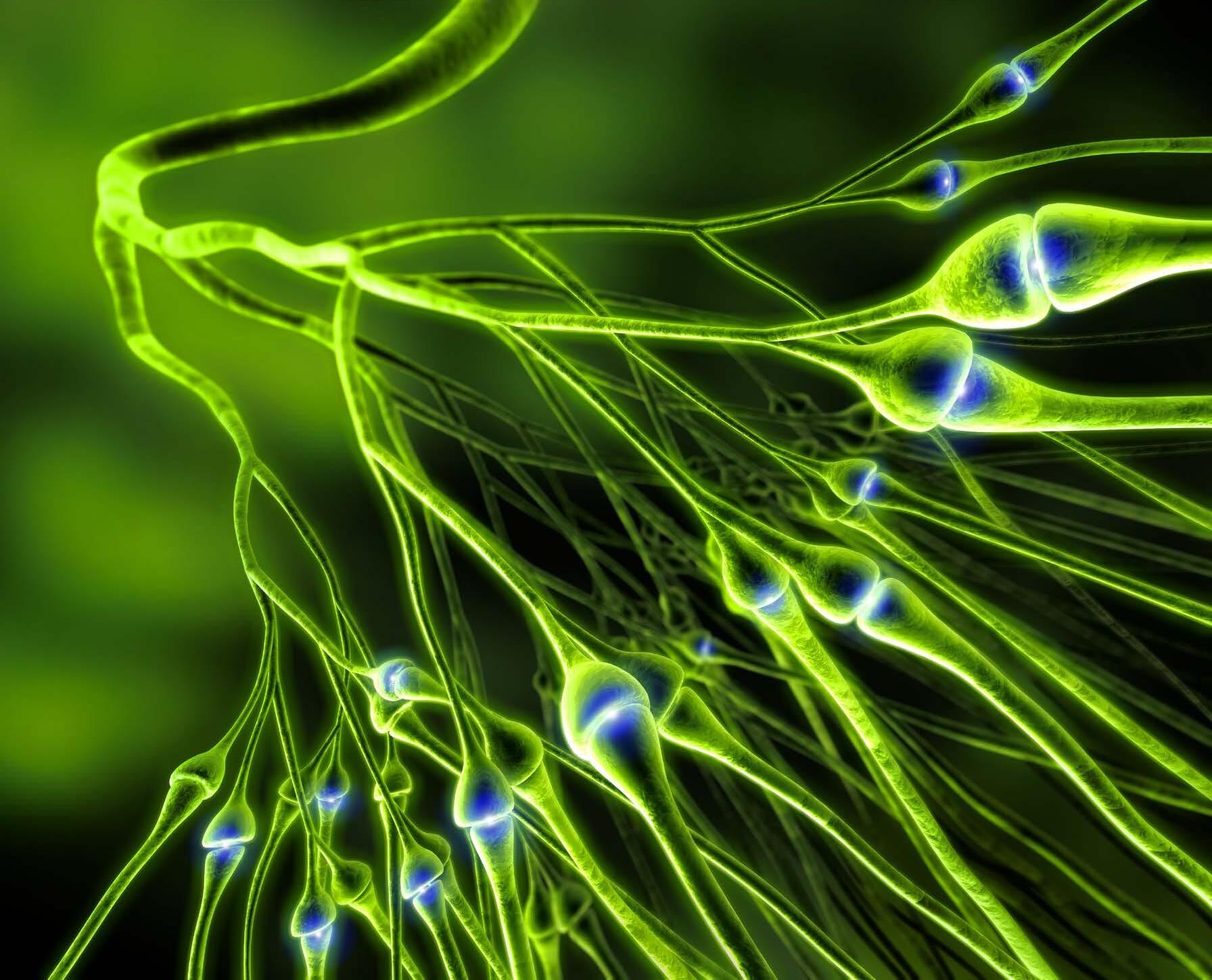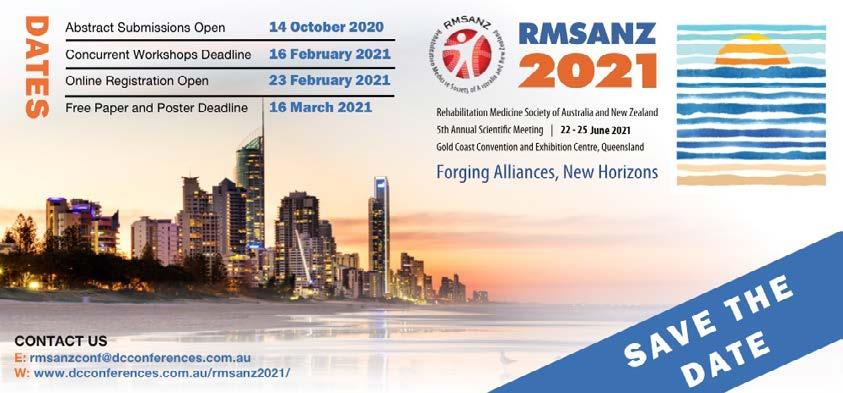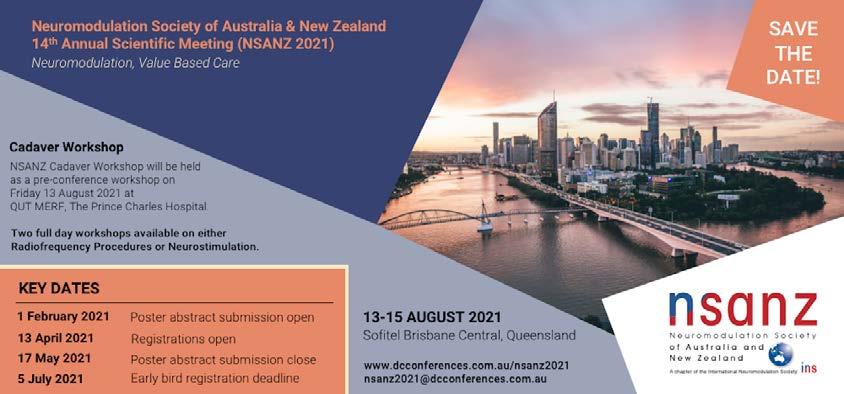Australian Pain Society NEWSLETTER





Welcome to 2021, the global year about back pain 2021 everyone. For those who were able to take a break, I hope you had a safe and enjoyable holiday period with your family and loved ones. Like many of us, I am keen to see the back of 2020 and it is hard to believe its February already.
With the New Year comes new events and please ensure you check out the upcoming events we have listed in this edition. The program for the 2021 APS virtual ASM (19th -20th April) has been released. There is a great line up of international and national speakers, there are plenty of topical sessions. In addition, for the first time a four (4) part webinar series will be held. Don’t forget the pre-conference workshops are being held online on Sunday 11th April 2021. Early bird registration deadline is the 9th March 2021 and registrations are still open.
The Faculty of Pain Medicine, Australian and New Zealand College of Anaesthetists have recently announced they are leading project to develop a pain management education strategy for Australian health practitioners. Once completed, this strategy will define a nationally consistent and comprehensive set of principles and goals to inform the development and implementation of pain management content within target health practitioner education programs at all levels. In collaboration with APS as a key partner the project team are aiming to implement a range of stakeholder consultation meeting workshops this year.
Dr Joanne Harmon
Denise Harrison has released a new discussion paper updating her previous seminal paper published 12 years ago on the eight myths or misconceptions of using oral sucrose for pain management in infants. Since then while we have moved forward, however, myths misconceptions, barriers and current knowledge gaps still prevail. Denise unpacks and presents these in detail in her latest publication.
Lastly Dr Alison Fleher provides us with a very concise critique book review on pain science -yoga-life: Bridging neuroscience and yoga for pain care. She comments that this book does provide valuable insights and recommends it for those interested in pain medicine and management.
Keep sharing with us your latest publications and reviews. Looking forward to seeing this year unfold and sharing with you all new developments and research about pain.
Joanne Assistant EditorProvided by the Australian Pain Society

Gut Feelings: The Microbiota-Gut-Brain Axis as a key Regulator of Visceral Pain
by Professor John CryanNeuropsychological Changes in Complex Reginal Pain
by Dr Janet BultitudeRisk stratification and targeted treatment: Effective for musculoskeletal motor vehicle crash injury?
by Professor Michele SterlingChanges in the scale of opioid consumption and cannabis in Australia by wastewater analysis
by Dr Cobus GerberAdditional information about the webinars is available at APS Webinar Website.
If you have missed the previous webinars provided by the Australian Pain Society, all webinar recordings (including the Q&A) are available in the Members Only Portal of the APS website.


Not a member and wish to purchase a copy of the webinar?

Email us at apswebinars@dcconferences.com.au
*APS Webinars are suitable for Health Professionals/ Researchers only.
The APS is 100% committed to bringing their members and delegates a conference in 2021. The decision was made late last year that the safest and most reliable way to do this is in a virtual only format.
The SPC has now re-worked our traditional format to better suit a virtual platform and we are excited about the content and quality of next year’s program.
Based on survey feedback from APS members and past-delegates, the Annual Scientific Meeting (ASM) has been condensed to a 2-day program that will be followed by a 4-part webinar series specifically designed to augment the main conference program. This way, we can be sure that we best meet your needs around online learning whilst also preserving the breadth and depth of information that is traditionally offered in our ASM.
The APS 2021 virtual ASM will now run from 19 - 20 April 2021, with the 4-part webinar series occurring on the last Tuesday of each month April–August
(NB: there will be no webinar in June due to IASP 2021).
Pre-Conference Workshops will be held online, on Sunday 11 April 2021.
Registrations for the conference will include access to all webinars. Pre-conference workshops are additional.
We are excited to connect safely with you online this year and can assure all delegates that the program will include the opportunity to network, collaborate and learn.
Registrations are now open, the early bird deadline has been extended until Tuesday 9 March 2021.
We understand that running a virtual conference means asking for your attention while you juggle work and home life as well, and for this reason, registered delegates will have access to all recorded conference and webinar sessions for the 12 months following APS 2021.
We are immensely grateful to the National Convention Centre Canberra (NCCC) , ACT, who have been flexible, understanding and considerate in their dealings with our 2021 venue booking.
We look forward to taking APS 2023 to the NCCC, ACT.
Should you have queries, please contact the Conference Secretariat.
Register now for the first APS VIRTUAL Conference. Be a part of Australia’s only multidisciplinary conference offering insights into the complex nature of pain management from a variety of medical, nursing and allied health perspectives.
To register please click here!
The APS 2021 virtual ASM will now run from 19 - 20 April 2021, with the 4-part webinar series occurring on the last Tuesday of each month April–August (NB: there will be no webinar in June due to IASP 2021).
Pre-Conference Workshops will be held online, on Sunday 11 April 2021.
Before 09 March 2021
The SPC has re-worked our traditional format to better suit a virtual platform and we are excited about the content and quality of next year’s program.
The APS 2021 virtual ASM will now run from 19 - 20 April 2021, with the 4-part webinar series occurring on the last Tuesday of each month April–August (NB: there will be no webinar in June due to IASP 2021).
Pre-Conference Workshops will be held online, on Sunday 11 April 2021.
The extensive program includes pre-conference workshops, international keynote speakers, national speakers, topical sessions and, for the first time, a 4-part webinar series.
We understand that attending a virtual conference means juggling work and home life, and for this reason, registered delegates will have access to all recorded conference and webinar sessions for the 12 months following APS 2021.
Follow the links to start planning your conference experience today!
PROGRAM OVERVIEW
WEBINAR SERIES
KEYNOTE SPEAKERS
TOPICAL SESSIONS
PRE-CONFERENCE WORKSHOPS
TRAINEE SESSION
Registrations are now open. To register please visit the conference website
Get in early and secure your place at Australia’s only multidisciplinary conference offering insights into the complex nature of pain management from a variety of medical, nursing and allied health perspectives. To register please click here!
Considering the benefits of your membership?
Save on your APS 2021 registration fee!
Early Bird Before 9 March 2021
Non-Member Registration Price VS
Becoming an APS Member
APS Student Member Registration Price
$695 OR
Being a member saves you up to $205 after membership fees!
Only $115
Being a member saves you $580 after membership fees!
Colleagues interested in becoming members and start saving on their registrations too? Tell them to become an APS Member and save right away!
You are invited to attend the Acute
This workshop will focus on back pain, from both acute and chronic pain perspectives. Topics will include; medications, surgical intervention evidence, physiotherapy interventions, gerontology management and back pain in pregnancy.
This workshop is targeted to all health care workers, nursing, allied health and medical, including GPs’.
When: Sunday 11 April 2021, 8.30am –5.00pm
Where: Virtual
For further information please click here
You are invited to attend the
This NEW workshop will discuss the best practice of pain management in the aged with adherence to the Aged Care Quality Standards Framework as well as best practice recommendations from various therapeutic frameworks e.g. RACGP, Palliative Care, National Prescribing Service.
Further, this interactive workshop will draw on the expertise of the audience, instigating multidisciplinary discussions to identify current barriers and a road map in going forward.
When: Sunday 11 April 2021, 8.30am–12.30pm
Where: Virtual
For further information please click here

This workshop aims to provide clinicians managing persistent pain in young people with updates and practical tips. In our first session we will explore prognostic factors for pain and disability in young people at presentation, then move on to the influence of parents on outcomes in children with persistent pain. This will be followed an introduction to the framework used at Children’s Hospital Westmead for understanding the body systems that mediate stress-induced somatic symptoms, including pain.
The second session will be an interactive multidisciplinary multistate panel case presentation taking the audience through an ED presentation through inpatient assessment, formulation, and management of a complex patient in an outpatient rehabilitation model.
When: Sunday 11 April 2021, 8.30 am–12.30pm Where: Virtual
For further information please click here
You are invited to attend the Fundamentals of Pain PreConference Workshop
This workshop is a succinct overview of the physiology, clinical assessment, and management of pain. It is aimed at GP’, specialist and allied health clinicians looking for an introduction to, or update on, persistent pain management.
When: Sunday 11 April 2021, 8.30 am–12.30pm
Where: Virtual
For further information please click here
You are invited to attend the
This workshop will address topics associated with early identification and management options of low back pain. The workshop will focus on current evidence based pharmacological options in managing low back pain, exploring the safety and efficacy of current treatment options, discussing patient expectations of the role they play and the role of the clinician in rationalising their usage.
There will be opportunities for questions and networking with peers, so that current evidencebased science can be optimised in everyday practice.
When: Sunday 11 April 2021, 1.30pm–5.00pm
Where: Virtual
For further information please click here
You are invited to attend the Basic Pain Research

This workshop will showcase the latest in Australian basic pain research from early career and senior researchers, and provide a forum for the BPR network to discuss mechanisms of nociception and pain across all levels of investigation: from molecular and cellular analyses, to studies in animals and humans (pre-clinical or clinical). The workshop is open to all basic researchers and clinician scientists, and this year has a particular focus on studies in osteoarthritis that provide a new mechanistic understanding or reveal new targets that may support the management of inflammatory and neuropathic pain.
When: Sunday 11 April 2021, 1.30pm–5.00pm
Where: Virtual
For further information please click here
You are invited to attend the Physiotherapy in Pain
This workshop will be highly practical – provoking attendees to consider HOW they deliver treatment to their patients. This workshop will be immediately useful in clinical practice as we delve into how to incorporate the best psychological approaches into our own style of intervention.
When: Sunday 11 April 2021, 1.30pm–5.00pm
Where: Virtual
For further information please click here
The Global Year About Back Pain aims to guide and support clinicians, scientists and the public in understanding the global challenges of preventing and treating back pain. Our globally represented task force seeks to provide a diverse range of information to assist in understanding what is currently known about the epidemiology, pathophysiology, and management of back pain, particularly with respect to the delivery of evidence-informed, costeffective services to those disabled by back pain. The 2021 Global Year Task Force recognises the difficulties presented with understanding and treating back pain across the world and hopes to facilitate changes needed to address the global burden of disability due to low back pain.
The aim of this year is to help clinicians, scientists and the public understand the nature of back pain and the utility of available treatment modalities. We aim to raise awareness of special considerations in different populations, including children and older adults. Ultimately, the Global Year Task Force aims to provide useful, practical and relevant resources
to assist a worldwide community in approaching the prevention and treatment of back pain.
1. To identify barriers and propose solutions for improving the prevention, investigation and treatment of back pain.
2. To summarise the most effective and costeffective modalities for the successful management of back pain, particularly in resource-poor communities.
3. To integrate the use of tools for stratifying people with back pain into management pathways with the provision of person-centred care.
4. To facilitate further research, management, education and advocacy needed to reduce the global burden of back pain.
Owen D Williamson Paul Cameron IASP Co-chair EFIC Co-chair 2021 IASP/EFIC GYABP 2021 IASP/EFIC GYABPThe 2021 Global Year About Back Pain has been officially launched by the International Association for the Study of Pain (IASP). Please click here to read more about the 2021 Global Year aim and objectives.

To access the IASP Fact Sheets, visit the Global Year page of the APS website. Logos and shareable graphics are also available on IASP’s website.
Along with our regular collaborators:
• New Zealand Pain Society
• Faculty of Pain Medicine, ANZCA
• Painaustralia
we encourage you to help raise awareness of this important topic.
If you conduct an event to raise awareness of Back Pain, please send us a report and photos to share with your fellow members.








Pain is recognised as one of the leading causes of disability and disease globally, with the number of people living with pain increasing each year1 Despite the need for skilled health practitioners to address the growing burden of pain, there is generally limited pain management content in health practitioner education at all levels worldwide.
Last year, the Faculty of Pain Medicine won a federal Department of Health grant to develop a multi-disciplinary pain management education strategy for a broad range of Australian health practitioners. The project supports Goal Three of the 2019 National Strategic Action Plan for Pain Management, which aims to “ensure health practitioners are well-informed and skilled on best practice evidence based [pain management] care”2
The International Association for the Study of Pain (IASP) highlighted the importance of health practitioners receiving adequate pain education at all levels of learning with its 2018 Global Year for Excellence in Pain Education3. The education strategy will be underpinned by the principles promoted by the IASP on an international level, including: interprofessional education; multidisciplinary pain management; and evidencebased care. It will be centred around the needs of health practitioners as learners and the needs of people accessing pain care, as well as promote a sociopsychobiomedical approach to pain management. Development of the strategy
is underpinned by the vision of improving the care experience and associated outcomes for people living with pain.
The completed strategy will define a nationally consistent and comprehensive set of principles and goals to inform the development and implementation of pain management content within target health practitioner education programs at all levels. Strategy development began in July 2020 with the initiation of a literature and environmental scan and the appointment of a governance advisory group to oversee the project. To ensure the strategy is well informed by key stakeholder input from across the fields of pain management and education, the project team will be implementing a range of stakeholder consultation workshops around the country this year, along with wider stakeholder consultation. We will continue to collaborate with the Australian Pain Society as a key partner during the stakeholder consultation process, underpinning our commitment to ensure multidisciplinary perspectives shape the strategy.
Please direct any queries or comments regarding the project to the Project Officer, Katy Elliott at kelliott@anzca.edu.au
Author: Meredith Craigie, Clinical Lead – Pain Management Health Practitioner Education Strategy
1 Vos T, Abajobir AA, Abate KH, Abbafati C, Abbas KM, Abd-Allah F, Abdulkader RS, Abdulle AM, Abebo TA, Abera SF, Aboyans V. Global, regional, and national incidence, prevalence, and years lived with disability for 328 diseases and injuries for 195 countries, 1990–2016: a systematic analysis for the Global Burden of Disease Study 2016. The Lancet. 2017 Sep 16;390(10100):1211-59.
2 Australian Government Department of Health. National Strategic Action Plan for Pain Management. [Internet]. Canberra; Australian Government Department of Health. 2019. [cited 2020 Nov 12]. p.16. Available from: https://www.painaustralia.org. au/static/uploads/files/national-action-plan-11-06-2019-wftmzrzushlj.pdf
3 Watt-Watson J. Prospectus to promote professional pain education [Internet] Washington D.C., International Association for the Study of Pain; 2018 [updated 2018; cited 2020 Nov 12] Available from: http://s3.amazonaws.com/rdcms-iasp/files/ production/public/globalyear/IASP%20Prospectus%20to%20Promote%20Professional%20Pain%20Education.pdf

Thank you to APS SIG member Denise Harrison for sharing the following recent publication.
Article first published online: 8th December 2020
Journal Reference: Harrison, D., In Press. Pain management for infants – Myths, misconceptions, barriers; knowledge and knowledge gaps. Journal of Neonatal Nursing. https://doi.org/10.1016/j.jnn.2020.12.004
DOI: https://doi.org/10.1016/j.jnn.2020.12.004
Twelve years ago, the paper ‘Oral sucrose for pain management in infants: Myths and misconceptions’ was published in the Journal of Neonatal Nursing. At this time, eight myths or misconceptions were addressed. Since this time there has been more than 100 studies published reporting on analgesic effects of sweet solutions in newborns, which have been synthesised and included in systematic reviews. There has also been a growth of literature to support analgesic effects of breastfeeding
and skin-to-skin care as well as concerning evidence of adverse long-term neurobehavioural outcomes associated with painful procedures. Yet, ongoing studies of pain management practices continue to report inconsistent use of these strategies during painful procedures. We are therefore at a cross-roads of evidence – there is knowledge of effective treatments, knowledge of harm of untreated pain, yet sick, premature as well as healthy infants are continuing to be exposed to painful procedures with no effective treatment. There are however ongoing myths, misconceptions, and practical barriers to using the evidence as well as ongoing knowledge gaps. This paper will therefore highlight existing myths, misconceptions, barriers and current knowledge gaps to using the three key evidence-based pain management strategies of breastfeeding, skinto-skin care and sweet solutions, in the hope that this will bring to light newborn infant pain treatment practices that can be improved.
Declaration: Denise Harrison has no disclosures or funding to declare.
Have you had an article accepted for publication this year?
The Australian Pain Society (APS) is keen to share publications from our members with their colleagues via our eNewsletter. If you’ve had an article accepted or published recently, please contact our Assistant Editor Joanne Harmon via the APS Secretariat ( aps@apsoc.org.au ) with the title, authors, and reference (i.e., journal, volume, and DOI) of your article and request the submission template. We would love it if you also supply a short commentary (300 words max) to give our readers the gist of the article.
Author/s: Niamh Moloney and Marnie Hartman
Date published: 2020
Publisher: Handspring Publishing
ISBN: 978-1-912085-58-3 & 978-1-912085-62-0 (Kindle eBook)
Dr Alison Flehr has a PhD in Pain Medicine and is currently working in the Bone Health and Fracture Program at the Mary MacKillop Institute for Health Research.
Alison is enthusiastic about pain science framed within a complex-trauma context with particular emphasis on the influences of autonomic functioning. Her PhD explored hot yoga as an ascending sensorimotor-retraining exposure therapy for persistent pain management in the community.
I very much enjoyed this book and welcome the bridging pain science with yoga therapy. Pain Science - Yoga - Life is a well set-out, approachable and is a widely successful integration of pain science and research with yoga therapy and practice. Both authors are trained physical therapy clinicians as well as yoga teachers and therefore have the knowledge and lived experience of pain medicine and yoga therapy.
The first three chapters of Pain Science - YogaLife comprise an overview of our understanding of pain and introductions to the concepts of yoga, and mindfulness. This lays a strong foundation for the reader, irrespective of their familiarity with the subject matter, to carry with them throughout the rest of the book. Following these are the sections ‘Headspace’, ‘Out of the Head and Onto the Mat’, and ‘Off the Mat and Into Life’, all presenting their information in an easy to understand, relatable way.
The integration of pain science with yoga begins on the first page of Chapter 1 with an overview of pain and yoga concepts presented in a Mandala. The ‘Pain Mandala’ is visited in every chapter of the book and is effective in layering complex information into a more digestible format. Also, I particularly liked their ‘text book’ approach, where at the end of each chapter there are exercises for the reader to practice the concepts they have just read about. Another technique that I thought particularly successful was the author’s use of case studies and their own personal experiences, scattered throughout the book and then revisited in later chapters providing a lived experience translation of the pain and yoga concepts being discussed.
However, I feel this was also a missed opportunity by the authors. They could have been more inclusive of autonomic functioning, specifically the role of the vagus nerve, in their integration of pain science with yoga. Such content would have fit very nicely within the framework of the ’Emotions and Pain’ chapter as it is a critical component of emotional processing. Further to that, the outer layer of their ‘Pain Mandala’ is comprised of the ‘Autonomic nervous system’, the ‘immune System’, and the ‘Endocrine system’, all of which are under the influence of the vagus nerve; and there is certainly research available connecting vagal activity and functioning with the ascending modulation of pain and also with yoga. Lastly, I have personally found that an explanation of the vagus nerve as the information superhighway connecting the mind with physical sensations in the body invaluable in dispelling “it is all in my head” misconceptions.
Regardless, Pain Science - Yoga - Life provides valuable insights into the power of yoga for pain care and the science in support of it. It also has the endorsement of some very well respected pain researchers whose opinions I value greatly. I would recommend it to anyone and everyone interested in pain medicine and management.
Dr Alison Flehr has nothing to declare.

Renewal notices for 2021 have been sent.
Thank you for your continued support and membership of the APS.
Please note:
1. We understand that circumstances change, so each year we ask you to select your appropriate level of membership.
2. This system of self-reporting subscription levels was implemented in 2009 for the benefit and fairness of all members.
Please refer to the rates below for your 2021 membership fee:
a. Regular A $110
b. Regular B $205
c. Regular C $310
d. Retired $65 Concessional Rate
e. Student $65 Concessional Rate
Before renewing, please ensure you review and update your member profile online. Payments can be made by Credit Card, BPAY, or Cheque.
Do you know that the Australian Pain Society is a registered charity? Your donation will help the Society to promote the prevention and control of diseases in human beings associated with pain. All donations of $2 or more to APS are tax-deductible.
New Members at 22 January 2021
Dr Alex Caple General Practice
Dr Jessica Stanhope Epidemiology
Dr Natasha Thomson Paediatrics
#AusPainSoc
Australian.Pain.Society
@AusPainSoc
For sponsorship and exhibition opportunities or more information please contact the APS Conference Secretariat

DC Conferences Pty Ltd
P: 61 2 9954 4400
E: aps2021@dcconferences.com.au

W: dcconferences.com.au/aps2021
Allan Basbaum is a professor and Chair of the Department of Anatomy at the University California San Francisco, USA. His research addresses the molecular mechanisms that underlie the generation of persistent pain after tissue or nerve injury.

Siri Leknes is a Professor of Social and Affective Neuroscience at the University of Oslo, Norway and a Senior Researcher at Oslo University Hospital. Her lab, the Leknes Affective Brain lab (LAB lab) studies how the brain and body give rise to pleasurable and painful feelings, and how these feelings are connected to decisions and behaviour.
Amanda C de C Williams is Reader (Associate Professor) in clinical health psychology at University College London; consultant clinical psychologist at the Pain Management Centre, University College London Hospital, UK; and research consultant for the International Centre for Health and Human Rights.











• Updated WHO Guidelines on the management of chronic pain in children (2020): https://apps.who. int/iris/bitstream/handle/10665/337999/9789240017870-eng.pdf?sequence=1&isAllowed=y
Other items of interest for our members:
• Latest opioid data from the Australian Bureau of Statistics: Opioid induced deaths in Australia. https://www.abs.gov.au/articles/opioid-induced-deaths-australia
• Australia’s annual overdose report 2019 from the Pennington institute: http://www.penington.org. au/australias-annual-overdose-report-2019/
• The Third Australian Atlas of Healthcare Variation: This series explores how healthcare use in Australia varies depending on where people live. It investigates reasons for variation that may be unwarranted, and provides specific achievable actions to reduce unwarranted variation https://www.safetyandquality.gov.au/atlas
• Painaustralia eNewsletter latest issue, available online at http://www.painaustralia.org.au/media/ enews
• ePPOC: electronic Persistent Pain Outcomes Collaboration: The electronic Persistent Pain Outcomes Collaboration (ePPOC) is an Australasian initiative that aims to improve the quality of care and outcomes for people who experience chronic pain. For more information about ePPOC, refer to the website: http://ahsri.uow.edu.au/eppoc/index.html
• PainHEALTH website: painHEALTH‘s aim is to help health consumers with musculoskeletal pain access reliable, evidence-based information and tips to assist in the co-management of musculoskeletal pain. painHEALTH is an initiative of the Department of Health, Western Australia. http://painhealth.csse.uwa.edu.au/
• Stanford University: CHOIR Collaborative Health Outcomes Information Registry https://choir. stanford.edu/
• Opioid Podcasts for GPs: These podcasts are produced by David Outridge GP, and FAChAM Trainee as a project under the auspices of Dr Steven Kelly Staff Specialist in Addiction Medicine, Kullaroo Clinic Gosford. A 20 week series from the Hunter Postgraduate Medical Institute (University of Newcastle): http://www.gptraining.com.au/recent-podcasts
• Airing Pain: Pain resources via an online radio show produced by Pain Concern, a UK registered Charity: http://painconcern.org.uk/airing-pain/
• Digital Health Guide: Developed by Primary Health Network Tasmania, check out the pain resources by accessing the link https://digitalhealthguide.com.au/Account/ LogOn?ReturnUrl=%2fSpecialtyFormulary%2f2 At login, Username: connectingcare, Password: health
• Indigenous Resources: New webpage on the APS website aggregating Indigenous resources: https://www.apsoc.org.au/Indigenous-Resources
NPS MedicineWise resources:
• Choosing Wisely Australia – News & media: https://www.choosingwisely.org.au/news-events/mediareleases/choosing-wisely-resource-addresses-patient-opioid-knowledge-gap
• Over the counter codeine – changes to supply: https://www.nps.org.au/medical-info/clinical-topics/ over-the-counter-codeine-changes-to-supply
• Medicines with codeine – what you need to know: https://www.nps.org.au/medical-info/consumerinfo/medicines-with-codeine-what-you-need-to-know
• Information about opioids and chronic non-cancer pain: U-tube clip (5.39mins) https://www.youtube. com/watch?v=8R4RT0pUCf4&feature=share&fbclid=IwAR2dbhzgEAcc7B-ogq2a6Xhud5FDkbciPbdJ9 pb94GnQI6pAeifGd1VP-_I
• Opioids: Communications videos: https://www.nps.org.au/opioids-communication-videos
TGA
• Codeine information hub: https://www.tga.gov.au/codeine-info-hub
NSW Agency for Clinical Innovation resources:
• Brainman and Pain Tool Kit translations, SEP15: http://www.aci.health.nsw.gov.au/chronic-pain/ translated-resources
• Pain Management Resources: http://www.aci.health.nsw.gov.au/resources/pain-management
• Quicksteps to Manage Chronic Pain in Primary Care: http://www.aci.health.nsw.gov.au/chronic-pain/ health-professionals/quick-steps-to-manage-chronic-pain-in-primary-care
– Built into Quicksteps: “How to de-prescribe and wean opioids in general practice”: http://www.aci. health.nsw.gov.au/chronic-pain/health-professionals/quick-steps-to-manage-chronic-pain-inprimary-care/how_to_de-prescribe_and_wean_opioids_in_general_practice
• A list of helpful apps for consumers and clinicians now available at: http://www.aci.health.nsw.gov. au/chronic-pain/health-professionals/management-of-chronic-pain
• Chronic Pain in the ED: https://www.aci.health.nsw.gov.au/networks/eci/clinical/clinical-resources/ clinical-tools/pain-management/chronic-pain-in-the-ed
These dates and events are current at the time of publication. Due to the current health concerns with COVID-19, we recommend you make your own enquiries before planning to attend
13-14 March 2021
Australia New Zealand Headache Society
Online
https://anzheadachesociety.org/2020-anzhsheadache-annual-scientific-meeting/
18-20 March 2021
New Zealand Pain Society Annual Scientific Meeting 2021
Copthorne Hotel, Bay of Islands, New Zealand
27 March 2021
Pain Association of Singapore Annual Scientific Meeting 2021
Online
https://www.pain-asm.com
11 April 2021
Australian Pain Society 41st Annual Scientific Meeting-Pre-Conference Workshops
Online
https://www.dcconferences.com.au/aps2021/ Pre-Conference_Workshops
19-20 April 2021
Australian Pain Society 41st Annual Scientific Meeting
Online
https://www.dcconferences.com.au/aps2021/
27 April - 4 May 2021
Australian and New Zealand College of Anaesthetists (ANZCA) Annual Scientific Meeting 2021
Online
https://www.anzca.edu.au/events-courses/ events/major-events/2021-anzca-asm
30 April 2021
Faculty of Pain Medicine (FPM) Symposium 2021
Online
https://www.anzca.edu.au/events-courses/ events/fpm-events/fpm-national-events/2020faculty-of-pain-medicine-symposium
6-8 May 2021
Exercise & Sports Science Australia (ESSA)
Online
http://researchtopractice2021.com.au
19-21 May 2021
Australian & New Zealand Society for Geriatric Medicine (ANZSGM)
Sofitel Melbourne on Collins,Melbourne,VIC http://www.anzsgmconference.org/
21-23 May 2021
Australian Psychological Society College of Clinical Psychologists
Sofitel Brisbane Central,Brisbane,QLD
https://www.psychology.org.au/APS-CCLINConf/2020
23-25 June 2021
Occupational Therapy Australia
Cairns Convention Centre,Cairns,QLD
https://www.otaus2021.com.au
27 June - 1 July 2021
International Association for the Study of Pain (IASP)
TBA
https://www.iaspworldcongress.org
13-15 August 2021
Neuromodulation Society of Australia & New Zealand (NSANZ)
Sofitel Brisbane Central,Brisbane,QLD
https://www.dcconferences.com.au/nsanz2021/
2-4 September 2021
International Neuromodulation Society Palais des Congrès de Paris,Paris,France
https://e-ins.org/
20-23 October 2021
Australian College of Rural and Remote Medicine (ACRRM) and Rural Doctors Association of Australia (RDAA)
The Crowne Plaza,Hunter Valley,NSW
https://rma.acrrm.org.au/register
21-23 October 2021
Australian Physiotherapy Association Brisbane Convention and Exhibition Centre,Brisbane,QLD
https://australian.physio/pd/conferences-andmasterclasses
11-13 November 2021
Australian and New Zealand Association of Oral & Maxillofacial Surgeons
Hotel Grand Chancellor,Hobart,Tasmania
https://www.anzaomsconference.com.au/
26-28 November 2021
Spine Society of Australia
International Convention Centre,Sydney,NSW
https://dcconferences.eventsair.com/ssa-2021/
24-27 March 2022
IASP Pain in Childhood SIG
Cordis Hotel,Auckland,New Zealand
http://www.ispp2022.nz/home.html
7-10 June 2022
Rehabilitation Medicine Society of Australia and New Zealand (RMSANZ)
Gold Coast Convention and Exhibition Centre,Gold Coast,QLD
https://www.dcconferences.com.au/ rmsanz2022/
Vision:
All people will have optimal access to pain prevention and management throughout their life.
Mission:
The Australian Pain Society is a multidisciplinary association whose mission is to advance pain prevention, management and clinical practice.
Priorities:
In order to achieve our mission, the Australian Pain Society will provide:
• Education
• Advocacy
• Research
• Services and resources
• Membership
• Good governance and operations
President:
A/Prof Anne Burke

Central Adelaide Local Health Network
Royal Adelaide Hospital
Adelaide SA 5000
Tel: 08 7074 2835 Fax: 08 7074 6247
President-Elect:
Ms Trudy Maunsell
Acute Pain Service
Princess Alexandra Hospital
Woolloongabba QLD 4102
Tel: 07 3176 5547 Fax: 07 3176 5102
Secretary:
Dr Will Howard

VIC
Tel: 03 9496 3800
Treasurer
Mr Tim Austin
Camperdown Physiotherapy
Newtown NSW 2042
Tel: 02 9517 1787 Fax: 02 9516 2491
ACT Director:
Dr Andrew Watson Calvary Hospital



Canberra ACT 2617
Tel: 02 6201 6352
NSW Director:
Dr Tim Ho

Inner West Pain Centre
RPA Medical Centre
Newtown NSW 2042
Tel: 02 9517 1764 Fax: 02 9517 1832
NT Director:
Ms Diann Black
Chronic Pain Service
Palmerston Regional Hospital
Holtze NT 0829
Tel: 08 7979 9502 Fax: 08 7979 9792
QLD Director:
Mrs Joyce McSwan
Gold Coast Primary Health Network
Persistent Pain Program, QLD
Tel: 0412 327 795 Fax: 07 3539 9801
SA Director:
Dr Michelle Harris

Royal Adelaide Hospital and Lyell McEwin Hospital
Adelaide SA
Email: michelle.harris2@sa.gov.au
TAS Director:
Mrs Dinah Spratt
Physiotas Physiotherapy
Shearwater TAS 7307
Tel: 03 6428 7500 Fax: 03 6424 7811
VIC Director:
Dr Laura Prendergast





Pain Service, Austin Health
Heidelberg VIC 3084
Tel: 03 9496 3134 or 03 5832 3020
WA Director:
Mr Shadreck Tozana
Functional Revival
Albany WA
Tel: 0437 541 165
Immediate Past President:
Ms Fiona Hodson
Hunter Integrated Pain Service
John Hunter Hospital Campus
New Lambton NSW 2305
Tel: 02 4922 3435 Fax: 02 4922 3438
SPC Chair:
A/Prof Kevin Keay



Department of Anatomy
University of Sydney
Sydney NSW 2006
Tel: 02 9351 4132 Fax: 02 9351 2817
IASP Liaison:
Professor Michele Sterling
RECOVER Injury Research Centre
University of Queensland
Herston QLD 4029
Tel: 07 3346 4793
Website: https://www.iasp-pain.org
Communications Coordinator:
A/Prof Anne Burke
Central Adelaide Local Health Network
Royal Adelaide Hospital
Adelaide SA 5000
Tel: 08 7074 2835 Fax: 08 7074 6247
Newsletter Editor:
Dr Lincoln Tracy
School of Public Health and Preventive Medicine
Monash University
Melbourne VIC 3004
Tel: 03 9903 0288
Newsletter Assistant Editor:
Dr Joanne Harmon




School of Clinical and Health Sciences
University of South Australia
Adelaide SA 5000
Tel: 08 8302 1442
PhD Scholarship Chair:
A/Prof Michael Farrell
Department of Medical Imaging and Radiation Services
Monash University
Clayton VIC 3800
Tel: 03 9905 6094 Fax: 03 9902 9500
Secretariat:
DC Conference & Association
Management Pty Ltd
PO Box 637
North Sydney, NSW 2059
Tel: 02 9016 4343
Email: aps@apsoc.org.au
Website: apsoc.org.au